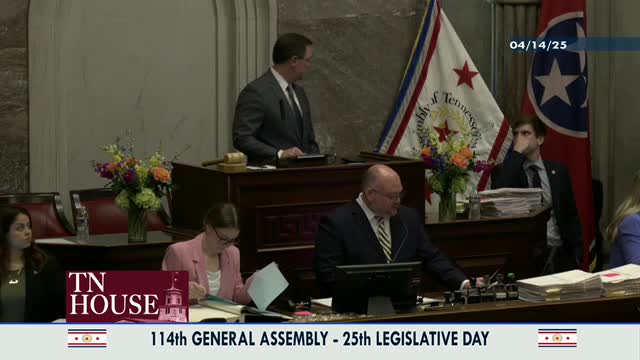Tennessee Assembly Debates Honor for Elon Musk Amid Pollution Concerns
This article was created by AI summarizing key points discussed. AI makes mistakes, so for full details and context, please refer to the video of the full meeting. Please report any errors so we can fix them. Report an error »

The Tennessee State Legislature convened on April 14, 2025, for its 25th Legislative Day, where discussions centered on a resolution honoring Elon Musk and SpaceX for their role in rescuing American astronauts from the International Space Station. However, the meeting quickly evolved into a heated debate over Musk's environmental impact in Tennessee, particularly concerning his company, XAI, which has been criticized for contributing to air pollution in Southwest Memphis.
Representative Pearson, who represents District 86, voiced strong opposition to the resolution, arguing that while Musk's achievements in space exploration are commendable, they should not overshadow the negative consequences of his business operations in Tennessee. Pearson highlighted the environmental damage caused by XAI's gas turbines, which he claimed are harming air quality and public health in his district. He emphasized the need for legislators to consider the broader implications of honoring individuals whose actions may adversely affect their constituents.
Despite Pearson's amendments aimed at addressing these concerns, including references to Musk's environmental record and his influence on federal policies, the proposed changes were ultimately rejected. The resolution honoring Musk was passed with a vote of 74 to 20, reflecting a divide among lawmakers regarding the recognition of influential figures versus accountability for their actions.
In addition to the Musk resolution, the session also addressed several other legislative matters, including bills related to education and teacher licensure. One significant proposal aimed to address teacher shortages by allowing individuals with industry experience to teach without traditional certification. While some lawmakers supported this approach as a necessary step to fill gaps in classrooms, others raised concerns about the quality of education and the importance of qualified teachers.
As the session concluded, the discussions underscored the ongoing tension between celebrating technological advancements and addressing the immediate needs and concerns of Tennessee residents, particularly in marginalized communities. The outcomes of these debates will likely influence future legislative priorities and the state's approach to balancing innovation with public welfare.
Representative Pearson, who represents District 86, voiced strong opposition to the resolution, arguing that while Musk's achievements in space exploration are commendable, they should not overshadow the negative consequences of his business operations in Tennessee. Pearson highlighted the environmental damage caused by XAI's gas turbines, which he claimed are harming air quality and public health in his district. He emphasized the need for legislators to consider the broader implications of honoring individuals whose actions may adversely affect their constituents.
Despite Pearson's amendments aimed at addressing these concerns, including references to Musk's environmental record and his influence on federal policies, the proposed changes were ultimately rejected. The resolution honoring Musk was passed with a vote of 74 to 20, reflecting a divide among lawmakers regarding the recognition of influential figures versus accountability for their actions.
In addition to the Musk resolution, the session also addressed several other legislative matters, including bills related to education and teacher licensure. One significant proposal aimed to address teacher shortages by allowing individuals with industry experience to teach without traditional certification. While some lawmakers supported this approach as a necessary step to fill gaps in classrooms, others raised concerns about the quality of education and the importance of qualified teachers.
As the session concluded, the discussions underscored the ongoing tension between celebrating technological advancements and addressing the immediate needs and concerns of Tennessee residents, particularly in marginalized communities. The outcomes of these debates will likely influence future legislative priorities and the state's approach to balancing innovation with public welfare.
View full meeting
This article is based on a recent meeting—watch the full video and explore the complete transcript for deeper insights into the discussion.
View full meeting